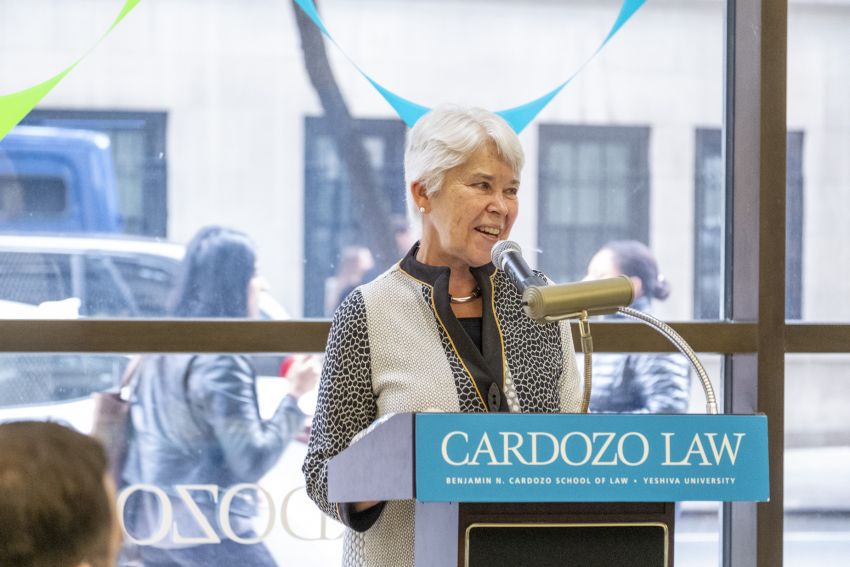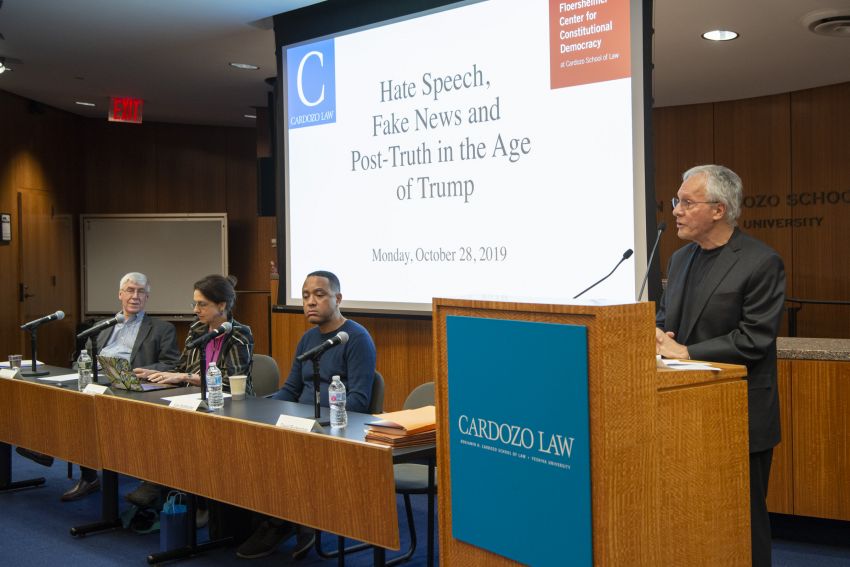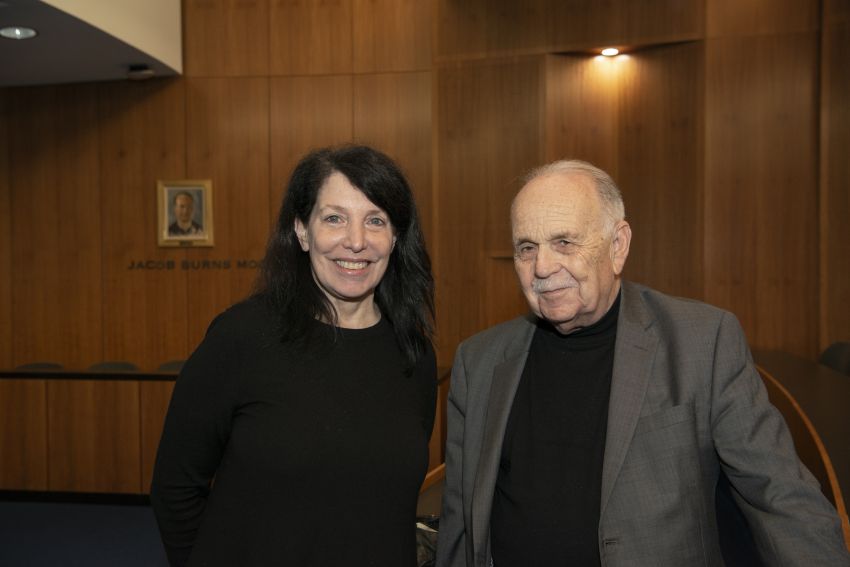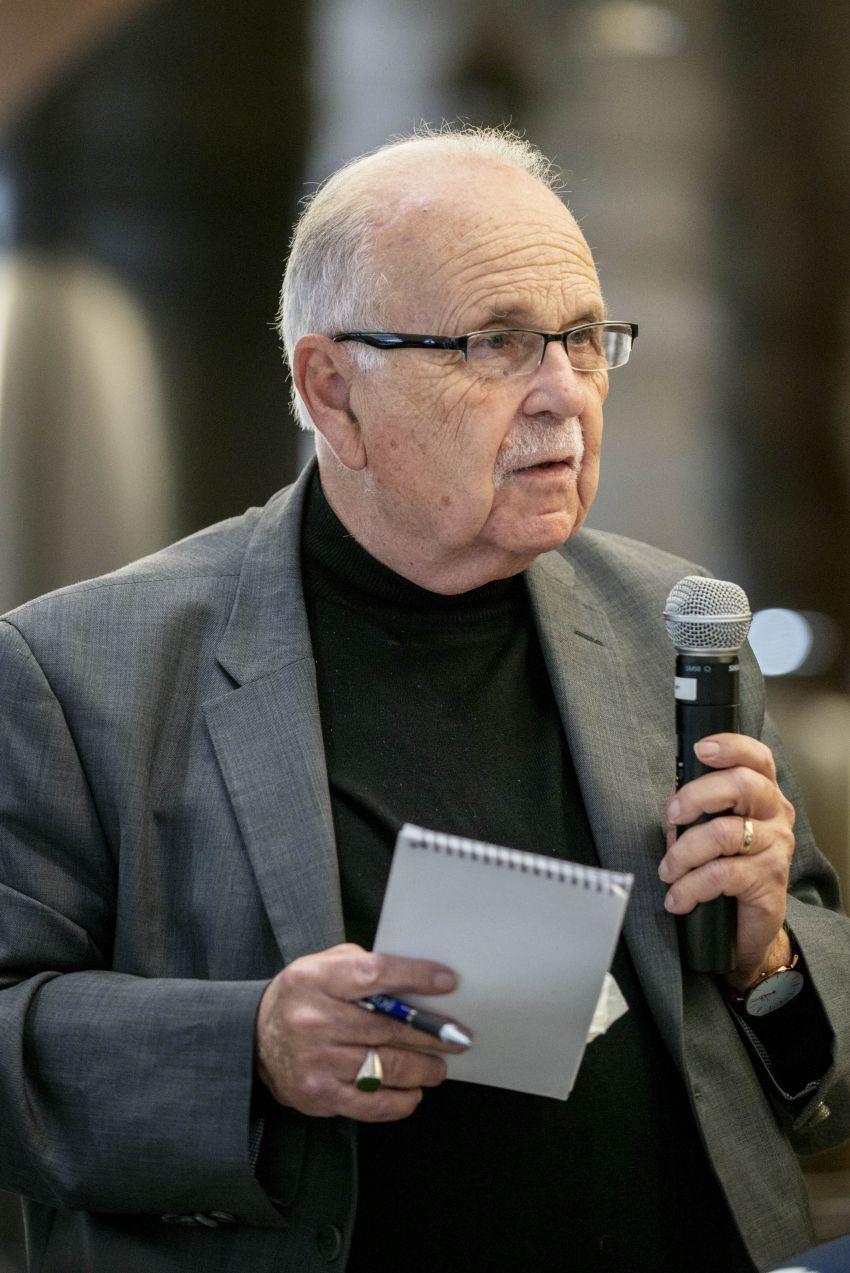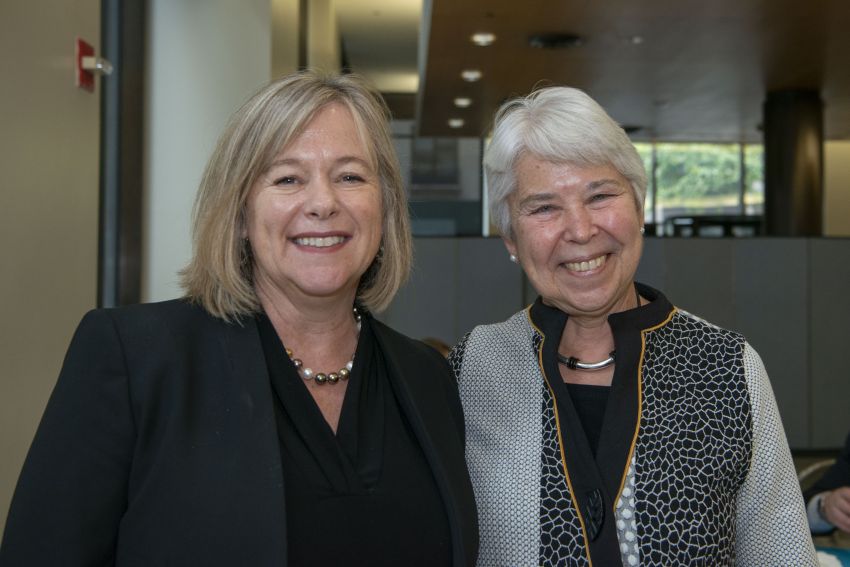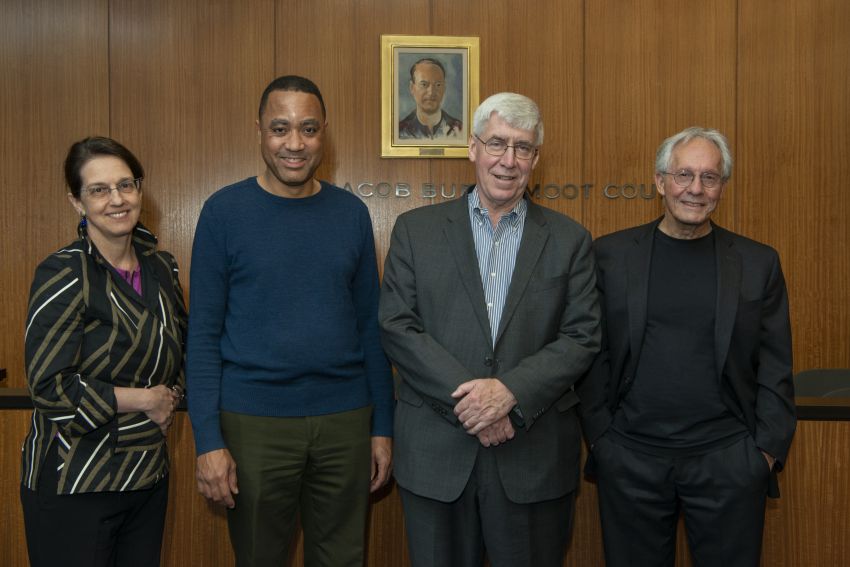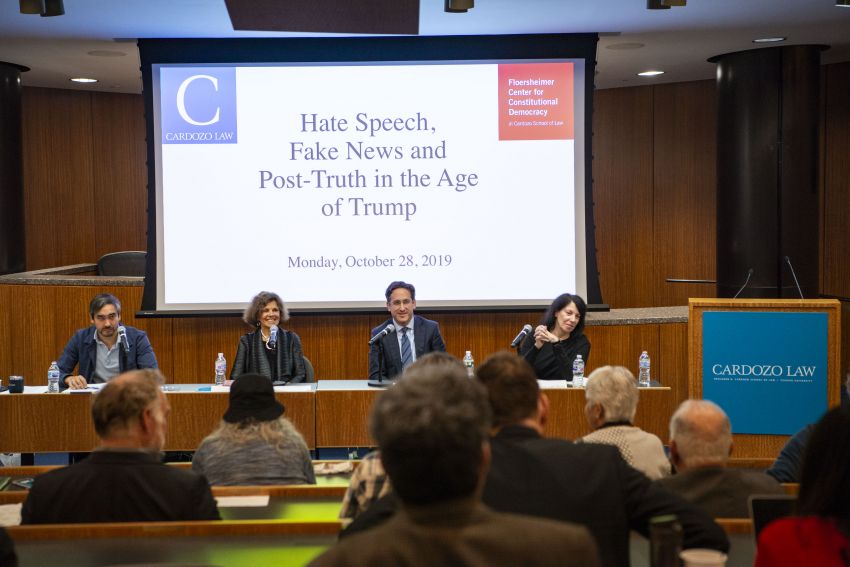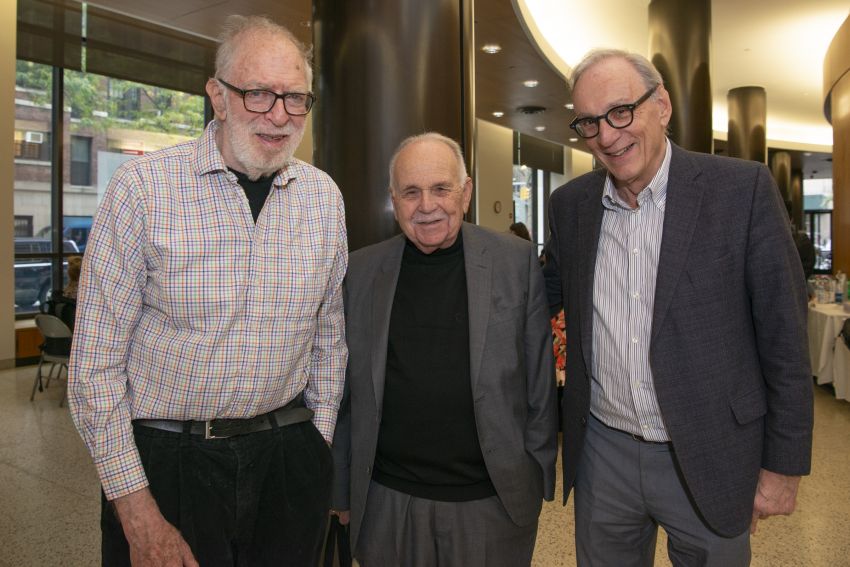
Left to right: Former Cardozo Dean Monroe Price with Professors Stanley Fish and Michel Rosenfeld.
Lively debates over the First Amendment sparked discussions between scholars and the public at the Floersheimer Center’s daylong event “Hate Speech, Fake News, and Post-Truth in the Age of Trump.” The conference celebrated Floersheimer Distinguished Visiting Professor Stanley Fish’s latest book The First: How to Think About Hate Speech, Campus Speech, Religious Speech, Fake News, Post-Truth and Donald Trump (Atria Books, 2019).
Several of Fish’s former colleagues and collaborators spoke at the event, held mostly in Cardozo’s Jacob Burns Moot Court Room. Professor Michel Rosenfeld offered an introduction of Fish’s work, summarizing that in his new book, Fish sees freedom of speech as “conceptual.”
“There’s no such thing as facts in truth,” Rosenfeld said. He said speech is changing as the secular societies are becoming more intolerant of religion and religious populations are becoming more intolerant of the secular.
“We have to always deal with the other as a person worthy of respect,” Rosenfeld said, adding that the book is an example of Fish’s “wonderful humanism.”
The first panel continued as Suzanne Last Stone moderated more insights and interpretations on the book. Nadine Strossen, Professor at New York Law School and author of HATE: Why We Should Resist it With Free Speech, Not Censorship, said the last chapter of Fish’s book asserts that “there is no distinction between truth, fact and opinion.”
Strossen, a former president of the American Civil Liberties Union (ACLU), said that not censoring doesn’t equate to complete inaction with regards to free speech. “My whole mission is to resist,” she said while holding up her own book.
Cardozo’s lobby was packed for the following portion of the event: the Lunch Keynote by Carol Christ, Chancellor of the University of California, Berkeley.
Dean Melanie Leslie introduced the chancellor by saying she is a “champion for diversity,” who has worked to improve her campus for students of all backgrounds.
In her keynote address, Christ gave an overview of the free speech movement on campus at Berkeley, which began in 1964 when students protested administration restrictions on political speech that prevented “political tabling” in certain prominent parts of campus. Her talk included an examination of how free speech issues on campus have become increasingly complex in the digital age. She discussed a recent student protest against Milo Yiannopoulos, a far-right commentator and political activist previously affiliated with Breitbart News. Students were protesting Yiannopoulos coming to Berkeley to speak. It wasn’t until the student newspaper The Daily Cal printed a list of speakers that students and faculty realized that “the speech was never intended to occur.” Christ said Yiannopoulos was expecting the school not to allow the event and that he only intended to create a “digital event” to spark controversy on campus and in the media.
“The First Amendment is a participant in partisan battles,” she said.
In the Q&A portion of the keynote, an audience member asked Christ about how to censor potentially hurtful speech without stifling conversation in classroom discussions, using an example of James Baldwin’s “I am Not Your Negro” being taught with this censored title, not the original title which contained a racial slur. Christ acknowledged there were reasons to restrict speech in class but in this case, she did not feel it was warranted.
Fish also chimed in from the audience: “anytime political sentiment is allowed into an academic setting, that setting has been corrupted.” He said universities should instead focus on turning topics into objects of analytical attention.
Christ added that setting up hard-and-fast rules regarding free speech could deny students the agency to express themselves in peaceful ways.
She added that many immigrant students “feel as if their right to be on campus has been challenged.”
“I don’t think political correctness is uniformly a bad thing,” she said.
The last panel of the event, moderated by Professor David Rudenstine, focused on the modern interpretations of the First Amendment, specifically regarding social media and race.
Susan Benesch, Director of the Dangerous Speech Project at Harvard University, urged the panelists to focus on “freedom not of speech but of reach.” She said the analysis should be brought back to the time, place and manner of the speech.
“No one forces you to have a Facebook account,” she said. Benesch noted the irony of the public considering the Chinese government as oppressive regarding free speech when Facebook censors a much larger amount of content.
“We don’t know for the vast majority of content what they are doing,” she said, asking audience members whether they have actually read Facebook’s terms and conditions. “We’re being governed secretly by a set of rules.”
John McWhorter, Professor of English and Comparative Literature at Columbia University, asked the attendees: “What is hate speech when it comes to race issues?”
McWhorter noted the rise of micro-aggressions, which he defined as subtle manners of speech that imply that black people are not the same tier as white people. He said that it was human nature to seek out those who are similar and therefore it was human nature to participate in hate speech. “People in diapers are ready to start hating.”
An audience member responded that McWhorter’s comment denied colonialism. After debating with the audience member, McWhorter concluded that how the audience member “screamed” at him was an example of his point.
Another audience member, who identified himself as Gregory Johnson, also sparked a debate with the panelists. Johnson said he was the defendant in the 1989 U.S. Supreme Court case Texas v. Johnson. The Supreme Court ruled 5-4 that Johnson burning an American flag outside of Dallas City Hall while chanting political slogans did not violate the First Amendment.
At Cardozo’s event, Johnson brought the panelists’ attention back to the title of the conference and asked why there wasn’t more discussion about how President Donald Trump is affecting free speech.
“We have a president that’s talking about ‘shit-hole countries,’” Johnson said. “We have people who are acting on this. It’s fascist. We’re not daring to look that reality in the eye.”
Another audience member said that many socially undesirable forms of speech are getting “shoved underground,” where only other enthusiasts are exposed to it. He argued that this only makes the speech more toxic. McWhorter responded to this comment saying that this outcome was still preferred to the slurs becoming a part of everyday society.
Fish ended the event by summing up the panel. He responded to free speech in the Facebook age by saying: “Mark Zuckerberg has become my favorite punching bag.” Fish said that the promise of the internet was to offer a communication platform with no gatekeeper. The idea was that it would become the “vehicle of universal agreement” but instead it has caused more censorship.
Regarding President Trump, Fish described him as a high-level practitioner in “the art of bullshit,” who is able to tell lies and truth in an indiscriminate mix. But Fish maintained that the purpose of the conference was not to consider urgent political questions but rather to analyze and act according to the academic setting. Fish ended by urging that structures be set up to facilitate speech between authorities and “to advance the search for truth.”

